In September, we published an interview with Jill Heinerth, who spoke about her fantastic book, “Into the Planet.” However, that’s not the only book we adored in 2019 that ties into the scuba world. Below, we’ve compiled five additional favorite fiction and nonfiction ocean reads that we think you’ll relish as much as we did.
“Under Pressure”
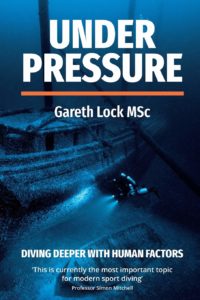
We were lucky enough to hear Gareth Lock, Global Underwater Explorer’s (GUE) director for risk management, present last year on “Dive Accidents and Fatalities: Why We Must Address the Human Factor in Diving” and he blew us away with his presentation. When we heard that he had published a book expanding on this topic, we bought it immediately and found it just as invaluable.
“Under Pressure” distills a variety of case studies and analyses into lessons divers can use to improve their diving and increase the safety factor regardless of level or experience. Divers won’t want to miss it.
From Amazon: “Most incidents and accidents are down to ‘human error.’ Unfortunately, ‘human error’ is normal and we can’t get rid of it. However, we can reduce the likelihood of one of those, ‘Oh s***t moments’ if we understand human factors and develop our non-technical skills.
This is a globally-unique book containing decades of research and practice from high-risk domains translated into the world of recreational and technical diving. This is done through the use of numerous detailed case studies to highlight the value and applicability of these skills. This book is a must for all divers who want to manage their risks more effectively and have fun in the process.”
“Beached”
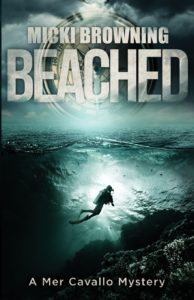
We stumbled on the first Mer Cavallo Mystery (“Adrift”) last year and were thrilled to find an engrossing read that accurately described diving and detailed a wreck we’ve explored in the Florida Keys—the famed Spiegel Grove. “Beached,” the second installment in the award-winning series, is just as fun and action-packed.
The author, Micki Browning, combines her background as an FBI National Academy graduate in municipal law enforcement for more than 20 years with her more recent experience as a divemaster to fashion a page-turner that both divers and mystery-lovers will adore. In “Beached,” Mer Cavallo returns as the marine biologist–turned-divemaster in Florida, and this latest book blends nautical archaeology and historical fiction into another great read. We can’t wait for the next installment in the series.
From Amazon: “In this latest thrilling mystery from bestselling author Micki Browning, marine biologist Meredith Cavallo uncovers clues to a mysterious Spanish galleon—and quickly discovers the ship may be legendary, but the danger surrounding it is real.
Mer’s life unravels after she finds a plastic-wrapped bundle floating on the waves off Key Largo. Curious, she pulls it aboard her dive boat and lands in the middle of a storm of intrigue involving an obscure legend, an 18th century shipwreck, and a modern pirate who’ll resort to murder to claim the booty first.”
Note: You can read “Beached” as a standalone, but we’d suggest starting with “Adrift” first to understand how it all begins.
“In Oceans Deep”
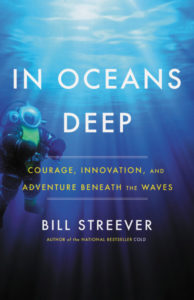
As divers, we couldn’t have been happier to pick up a well-written nonfiction read packed with interesting stories that celebrate our history underwater. Written by Bill Streever, a biologist who’s a long-time recreational and commercial diver, “In Oceans Deep” mixes history with first-hand accounts. Streever’s love of the ocean, his knack for storytelling, and his dry sense of humor shine through in this educational yet thoroughly engaging read.
From Amazon: “In the spirit of Bill Bryson and Ian Frazier comes this fascinating examination of our past, present, and future beneath the waves. In an age of unprecedented exploration and innovation, our oceans remain largely unknown and endlessly fascinating: full of mystery, danger, beauty, and inspiration. Bill Streever has masterfully woven together the science and history of Earth’s last remaining frontier: the sea.
“The Island of Sea Women”
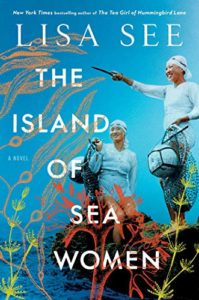
The ancient tradition of female free divers on the South Korean island of Jeju sparked our imagination in the news and this work of historical fiction supplied more insight. While we’re sure non-divers enjoyed the “Island of Sea Women” story about friendship and a matriarchal society, we remain astounded by the breathtaking descriptions of decades of diving in frigid water with little equipment.
From Amazon: “Mi-ja and Young-sook, two girls living on the Korean island of Jeju, are best friends that come from very different backgrounds. When they are old enough, tey begin working in the sea with their village’s all-female diving collective, led by Young-sook’s mother. As the girls take up their positions as baby divers, they know they are beginning a life of excitement and responsibility but also danger.
Despite their love for each other, Mi-ja and Young-sook’s differences are impossible to ignore. “The Island of Sea Women” is an epoch set over many decades, beginning during a period of Japanese colonialism in the 1930s and 1940s, followed by World War II, the Korean War and its aftermath, through the era of cell phones and wetsuits for the women divers.”
Note: This book depicts some graphic/violent historical scenes.
“Other Minds”
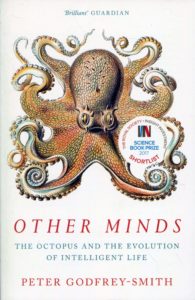
Imagine that Jacques Cousteau became a professor of philosophy and history, and you’ll get a sense of the wonder and beauty we discovered in this entrancing book. If you haven’t yet fallen in love with the octopus, you will after reading this captivating narrative, by Peter Godfrey-Smith, depicting octopus encounters in the wild interwoven with amazing philosophical, historical, and scientific ideas around intelligent life and sentience.
From Amazon: “Although mammals and birds are widely regarded as the smartest creatures on earth, it has lately become clear that a very distant branch of the tree of life has also sprouted higher intelligence: the cephalopods, consisting of the squid, the cuttlefish, and above all the octopus. In captivity, octopuses have been known to identify individual human keepers, raid neighboring tanks for food, turn off lightbulbs by spouting jets of water, plug drains, and make daring escapes. How is it that a creature with such gifts evolved through an evolutionary lineage so radically distant from our own? What does it mean that evolution built minds not once but at least twice? The octopus is the closest we will come to meeting an intelligent alien. What can we learn from the enc

